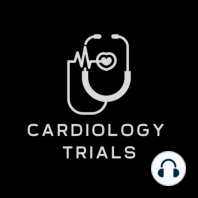8 min listen
Review of the CURE Trial
ratings:
Length:
12 minutes
Released:
Mar 5, 2024
Format:
Podcast episode
Description
N Engl J Med 2001;345:494-502.Background The established medical treatments for acute coronary syndrome reviewed so far include aspirin and thrombolytics along with a smaller role for short-term anticoagulation. Angiotensin converting enzymes inhibitors and, to a lesser extent, beta blockers were also found to reduce recurrent ischemic events and death as well as heart failure and ventricular remodeling. The EPHESUS trial, which studied Eplerenone in this patient population was not published until several years later.Cardiology Trial’s Substack is a reader-supported publication. To receive new posts and support our work, consider becoming a free or paid subscriber.Despite the benefits of the above therapies, patients who experienced an ACS event were still at a substantially higher risk for experiencing recurrent events compared to patients who never experienced an ACS event. Significant interest remained in finding additional agents to reduce “residual risk” (i.e., the risk of recurrent events that is left over after initiating effective therapies). Imagine a heart attack survivor has a 20% risk of experiencing death, non-fatal MI or heart failure over the next 5 years. Now imagine that all known effective therapies cumulatively reduce that risk by 30% (a 6% absolute reduction in risk); the residual risk for events over 5 years would still be 14%, which is still high, and significantly higher than patients who never experienced an ACS event (e.g., primary prevention patients).Thienopyridine derivatives, including clopidogrel, are antiplatelet agents with a different mechanism of action than aspirin. Up to this point in time they demonstrated efficacy in patients who had received a coronary stent for reducing myocardial infarction compared to either aspirin alone or warfarin. The Clopidogrel in Unstable Angina to Prevent Recurrent Events (CURE) trial sought to test the hypothesis that 3 to 12 months of clopidogrel plus aspirin versus aspirin alone would reduce the rate of cardiovascular events (a composite endpoint) compared to aspirin alone in patients with ACS and no ST-segment elevation.Patients Patients were eligible if they had been hospitalized within 24 hours after the onset of symptoms, who had either ECG changes or an elevation in cardiac enzymes at entry, and did not have ST-segment elevation. Exclusion criteria included a contraindication to antithrombotic or antiplatelet therapy, high bleeding risk or severe heart failure, those who were taking oral anticoagulants, and those who had undergone coronary revascularization in the previous 3 months or had received intravenous glycoprotein IIb/IIIa receptor inhibitors in the previous 3 days.Baseline characteristics No information in the main manuscript is provided on the ratio of patients eligible to those enrolled, which limits our ability to make inferences about external validity. The average age of participants was 64 years of age and nearly 40% were woman, which is historically higher than the trials reviewed up to this point. The average time from pain onset to randomization was 14 hours. The diagnoses at study entry were unstable angina in 75% and MI in 25%. Many patients in the trial has a history of MI (32%) or revascularization (18%) in the past and the majority were either current or former smokers (61%). Most patients (94%) had some ECG abnormality; the most common being ST depression (42%) and T-wave inversion (36%).Procedures Immediately following randomization patients were administered a 300 mg loading dose of clopidogrel or matching placebo followed by 75 mg per day of clopidogrel or matching placebo for 3 to 12 months (the mean duration of treatment was 9 months). Aspirin was started or continued simultaneously with the study drug or placebo. Follow-up assessments occurred at discharge, at 1 and 3 months, and then every 3 months until the end of the study (12 months).Endpoints The first primary endpoint was the composite of death from cardiovascular cau
Released:
Mar 5, 2024
Format:
Podcast episode
Titles in the series (40)
Review of the GISSI-1 Trial by Cardiology Trials
